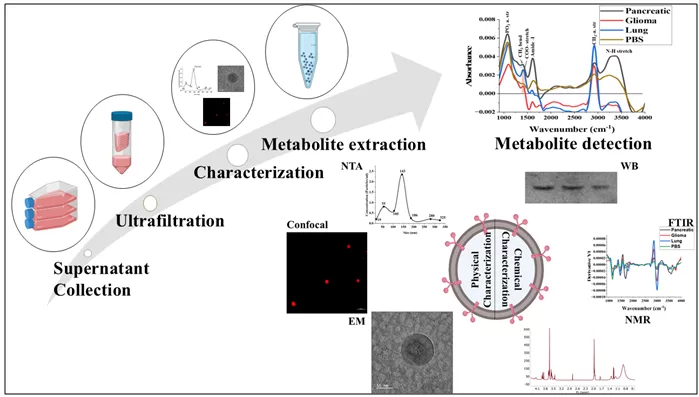Researchers have made a groundbreaking discovery by identifying common metabolites across multiple cancer types, including pancreatic and glioma cancers. This significant finding paves the way for a potential non-invasive method for early cancer diagnosis and improved therapeutic strategies.
Aggressive cancers such as pancreatic and glioma are often diagnosed at advanced stages, leading to poor prognoses. The lack of reliable early detection methods necessitates the search for effective, non-invasive biomarkers that can bridge critical gaps in cancer diagnostics and treatment. Scientists are now focusing on nano messengers called exosomes, which act as carriers of tumor-derived metabolites, offering valuable insights into the tumor microenvironment (TME).
A team from the Institute of Nano Science and Technology (INST), Mohali—an autonomous institute under the Department of Science and Technology (DST)—led by Ms. Nandini Bajaj and Dr. Deepika Sharma, has identified metabolites in exosomes derived from pancreatic, lung, and glioma cancer cell lines. These findings suggest the potential for universal cancer biomarkers, thereby enhancing clinical applicability and paving the way for precise cancer detection and targeted treatment strategies.
The researchers employed a multi-technique approach, integrating Nanoparticle Tracking Analysis (NTA), Electron Microscopy (EM), Western Blot (WB), Fourier Transform Infrared Spectroscopy (FTIR), untargeted Liquid Chromatography-Tandem Mass Spectrometry (LC-MS/MS), and Nuclear Magnetic Resonance (NMR). This comprehensive characterization of exosomes surpasses conventional single-method studies, advancing the field of cancer diagnostics, personalized medicine, and cancer progression research.
By identifying dysregulated pathways within the TME, this research provides crucial insights into cancer progression and enables more precise therapeutic targeting. The study, published in the journal Nanoscale, has the potential to revolutionize cancer treatment by leading to targeted therapies that disrupt metabolic pathways in tumors. These advancements could enhance treatment efficacy while minimizing side effects, ultimately improving patient outcomes through personalized, precision medicine approaches.
Disclaimer: The information presented in this article is based on research findings and is intended for informational purposes only. It should not be used as a substitute for professional medical advice, diagnosis, or treatment. Readers are advised to consult healthcare professionals for any medical concerns.












